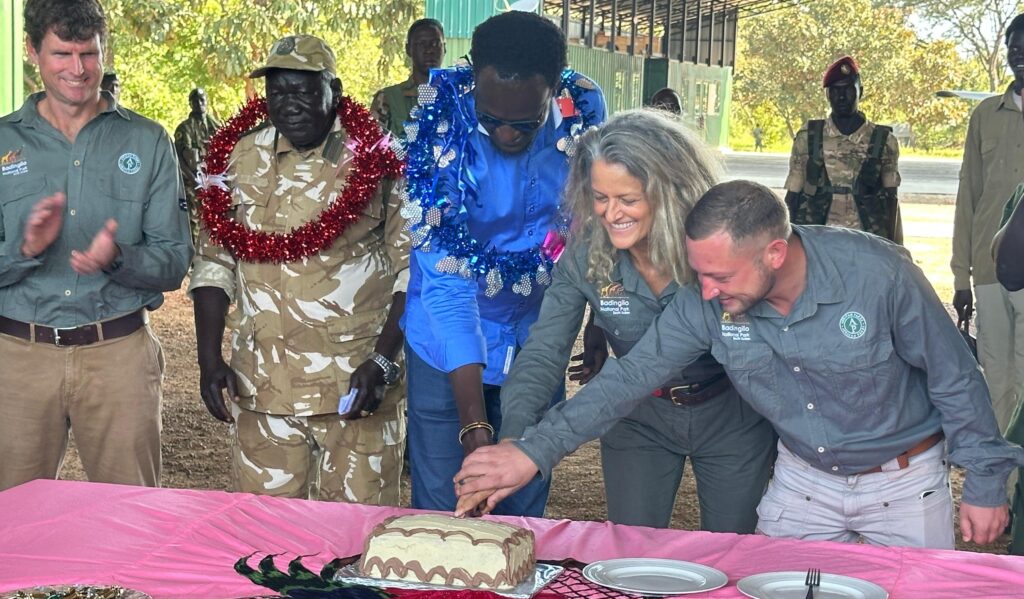The Minister of Wildlife Conservation and Tourism, Denay Jock Chagor, has praised the work of African Parks and its conservation efforts in South Sudan.
According to a press release extended to Radio Tamazuj on Monday, the minister visited Badingilo Headquarters (BHQ) from 18to 19 November in a significant step in strengthening the partnership between the Ministry and African Parks, underscoring a shared commitment to safeguarding South Sudan’s exceptional natural heritage.
African Parks is a non-profit conservation organisation that takes on responsibility for the long-term management of protected areas in partnership with governments and local communities. African Parks manages 24 protected areas in 13 countries covering over 20 million hectares in South Sudan, Angola, Benin, Central African Republic, Chad, the Democratic Republic of Congo, Ethiopia, Malawi, Mozambique, the Republic of Congo, Rwanda, Zambia, and Zimbabwe. In South Sudan, African Parks manages Boma and Badingilo National Parks.
Jock was welcomed by the Law Enforcement team with a guard of honour and received a comprehensive briefing from African Parks leadership, including Chief Operations Officer Charles Well, Landscape Coordinator Dr. Mike Fay, Regional Operations Manager Dudu Douglas-Hamilton, Country Representative Florington Aseervatham, and Park Manager John Vogel.
The minister expressed deep appreciation for the work at Badingilo and the unity among staff.
“What I am seeing today truly delights me. This is not only a park – it is a place where peace can be built. I see officers from every corner of South Sudan here, from all our tribes, working side by side. This is not just a park, but also unity,” he said. “What I’ve seen here is a model of how conservation can be done – with integrity, transparency, collaboration, and real impact for our people and our wildlife.”
Addressing wildlife officers, Jock emphasised patriotism and stewardship.
“This is your place. You belong here, and you work for your country, your history, and your ancestors’ land. I know you face many challenges, but bear with us – things will improve,” he said. “Protect your land, protect your history, protect your heritage. What you are doing is not for anyone else; it is for yourselves.”
The minister was presented with the Badingilo–Boma Landscape Vision, the Long-Term Strategic Strategy (LTSS), and key conservation achievements to date. He toured the Operations Control Room, observing real-time landscape monitoring and data analysis that inform conservation decisions.
The African Parks leadership welcomed the minister’s words and reaffirmed the value of close government partnership.
Country Representative Florington Aseervatham said the visit reaffirms the shared commitment to protecting the Badingilo–Boma landscape.
“We are proud to work with government and communities to build a future where conservation brings stability and opportunity,” he stated. “Without the support of the Ministry, African Parks would not be here – we remain committed to full cooperation in achieving the goals of the Ministry and the Republic of South Sudan.”
The visit concluded with a flight to Nyat, where the minister met with local stakeholders, including Gola Boyoi, the Chief Administrator of the Greater Pibor Administrative Area (GPAA), and engaged key community stakeholders. While in Nyat, Jock toured significant conservation sites, including the Nyat Training College and Maruwa Camp, which was built to host tourists.
As part of advancing tourism in South Sudan, the Minister’s engagements also highlighted new opportunities for community-based tourism.
“This initiative is part of ongoing efforts to strengthen tourism development, creating spaces where conservation and tourism jointly deliver economic benefits and cultural pride for local communities,” the statement concluded. “African Parks remains dedicated to supporting South Sudan’s conservation goals through inclusive, transparent, and locally grounded approaches.”




